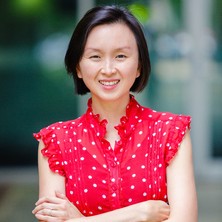Dr Li-ann Leow (UQ) - Dopamine alters the effect of brain stimulation on behaviour.
Abstract
The field of neuroscience has a rich history of using brain stimulation to perturb brain function to understand the neural mechanisms underpinning cognition and behaviour. The most prevalent of these brain stimulation techniques is transcranial direct current stimulation (tDCS), which has gained popularity because of its low-cost and tolerability, as well as its promise in improving many treatment-resistant conditions, such as depression and stroke (Fregni et al., 2021, Int. J. Neuropsychopharmacol), and more recently, post-COVID fatigue (Oliver-Mas et al., 2023, Brain Communications). Yet, we have incomplete knowledge of the neural mechanisms through which tDCS affects cognition and behaviour, limiting our capacity to optimally use tDCS, both as a method to investigate brain function, as well as a therapeutic device within clinical contexts.
Dopamine has been implicated in the effects of brain stimulation on brain function. For example, pharmacologically manipulating brain dopamine levels results in a 20-fold increase in the persistence of effects of tDCS on motor cortex excitability (Kuo et al., 2008, Cereb Cortex). Yet, evidence that directly implicates dopamine in stimulation-induced changes in cognition and behaviour is missing. In this talk, I describe work which leverages a pharmacological perturbational approach to investigate the role of dopamine in the way tDCS affects behavour.
Bio
 Li-Ann Leow is a research fellow at the School of Psychology at the University of Queensland, with expertise in motor learning and motor control, and the use of pharmacological manipulations of dopamine and non-invasive brain stimulation techniques to modulate motor learning and motor control.
Li-Ann Leow is a research fellow at the School of Psychology at the University of Queensland, with expertise in motor learning and motor control, and the use of pharmacological manipulations of dopamine and non-invasive brain stimulation techniques to modulate motor learning and motor control.
About Seminar Series
The School of Psychology Seminar Series involves regular formal presentations of high-quality scholarly work with broad appeal.
The wider School community is invited to attend, including academic and professional staff, special guests, visitors, as well as HDR, postgraduate and honours students.
Seminars are held fortnightly on Wednesdays 12:00-1:30 in room s402, Social Sciences Building.
